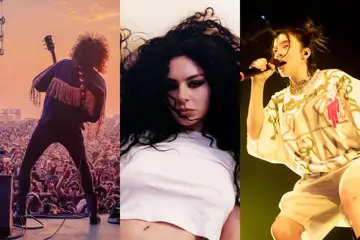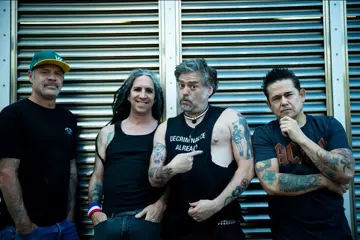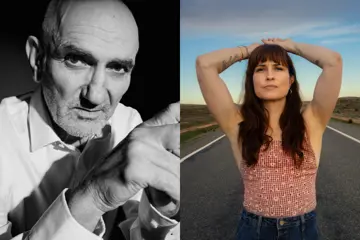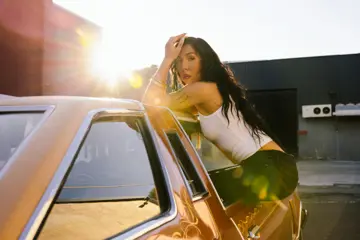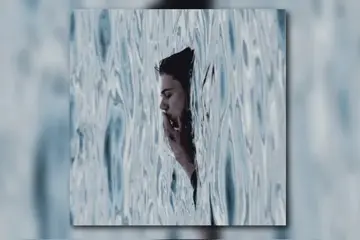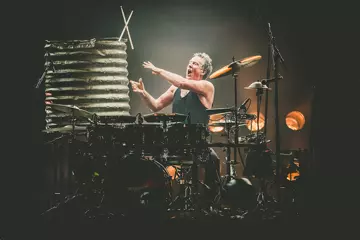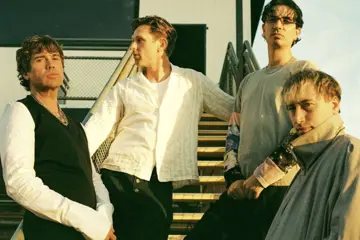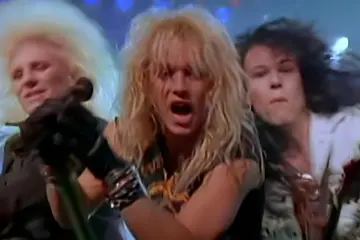Tricky (AKA Adrian Thaws) has accepted that 1995's classic Maxinquaye will always be a touchstone for his work. And, in doing so, he's furnished a credible 10th album, False Idols - a meta-commentary on celebrity culture. Thematically, it harks back to Thaws' rap Tricky Kid (a line of which inspired New Zealand band The Naked And Famous' name). False Idols might be his My Beautiful Dark Twisted Fantasy.
Three years ago the nomadic Brit, based in the US since the late '90s, moved to Paris. He wasn't attracted to the French city to be 'cool', like Kanye West. "I live there, to be honest, because there's nothing to do there," Thaws says. "I'm not really into partying or anything too much." Paris affords fewer distractions. "It's one of the worst places I've ever been to go to clubs. It's terrible. The clubs are very boring there." In Los Angeles Thaws was "too happy almost". "I didn't get much done in the States. I was having too much fun. You've gotta work, you've gotta make a living. I'm a musician. I was doing less and less music the longer I lived there. My output was just basically coming to a standstill."
Thaws is perceived as the archetypal struggling artist - temperamental and unco-operative. He is passionate, yes. But he's also frank, gregarious and dryly funny. Thaws can be flippant but, more often, he's self-effacing. He's certainly never been a slacker.
The lad from Bristol's Knowle West council estate was raised by his grandmother, his father disappearing before his birth and mother committing suicide. Thaws found another family in the Wild Bunch sound system, which developed into Massive Attack. He was a vocalist on their seminal debut, Blue Lines - and Protection. But Thaws felt artistically thwarted and, when Massive Attack rejected his tune Aftermath, he released it independently. Along the way, Thaws encountered the mysterious Martina Topley-Bird, then a precocious teenager, who'd become his muse, foil and lover (they have a daughter). He signed to Chris Blackwell's Island Records.
Don't miss a beat with our FREE daily newsletter
Thaws' late mother, Maxine Quaye, haunted his dark premiere, Maxinquaye. Critics lauded it. They tagged Thaws' multicultural, and postmodern, fusion of hip hop, dub, blues, soul, rock and electronica 'trip hop' - a label he'd contest. As an MC, Thaws was less interested in environment, or appearances, than the psyche - more trip than hop. He'd manifest his own discordant genre.
Each of Thaws' successive albums represents a chapter in a bigger story. He reacted to the hype surrounding Maxinquaye by unveiling Nearly God, a collaborative project with Terry Hall, Alison Moyet, Neneh Cherry and sometime girlfriend Björk. Relocating to New York, Thaws made Angels With Dirty Faces, entailing the gothic blues Broken Homes with PJ Harvey - ostensibly his response to The Notorious BIG's murder. Later, the rebellious b-boy conceived an anti-gangsta album in Juxtapose, liaising with Cypress Hill's DJ Muggs and Ruff Ryders affiliate Dame Grease. It was his farewell to Island. Aligning himself with the improbable Hollywood Records, Thaws reverted to grungy, albeit eccentric, rock for Blowback. (He duetted with Cyndi Lauper on the incongruous Five Days.) Thaws even acted in Luc Besson's sci-fi The Fifth Element.
Nevertheless, Thaws has revealed that he "was lost for ages". In 2008 he put out the buzzworthy Knowle West Boy, with production from Suede's Bernard Butler and Switch, on London's Domino Records. Mixed Race followed. Long distrustful of labels, Thaws now says that, while Domino is "a great label", boss Laurence Bell was interfering, journeying to his studio to listen to demos. "I've been doing this for so long that I don't think Laurence really should be giving me an opinion whether I'm ready to mix." As such, recording was "quite painful". Thaws missed Island, where he could "hang out". "I used to go and sleep on the couch sometimes." Domino was corporate in comparison. "So I had no home, I haven't had a home for ages - so that's what I mean by 'lost'." Last year Thaws and Topley-Bird toured the UK, recreating Maxinquaye live - and even returning to Bristol. 'Tricky' has come full circle. Thaws is releasing False Idols on his own label, also called False Idols (he previously had the imprints Durban Poison, briefly home to Grace Jones, and Brown Punk). "It makes more sense to me."
Thaws feels centred. He's again making music without consciously pleasing A&R types. "I'm evolving now by not thinking - I'm learning not to think again. All my music was done through instinct before." Thaws held over the Domino-era We Don't Die for False Idols, concerned that its minimalism, and roughness, wouldn't go down well with Bell. "I could have made it into a bigger song - but it's just a vibe, and that's all it's supposed to be." Thaws is an intuitive experimenter - and transgressor. "I make my music by being naive and, because I'm naive, that's why people tell me my time signatures are strange and my beats are strange - and the reason is because I don't know what I'm doing. I don't know the structure of music properly. [But] I need to stay naive. I need not to think too much. I think, when I'm naive, I make my best music – because, when you're naive, you create something, you haven't got something to follow." Ironically, RZA's musicality has been similarly queried by those who don't appreciate its subliminal, textural nature. Thaws' albums are more critiqued than most acts, he rues. His music can be over-intellectualised. "For me, this is what I do - it's like breathing, eating," Thaws says. "I wouldn't consider myself talented. I'm just a guy from the street who got an opportunity to make some music." Still, he's rightly proclaimed an innovator - and revolutionary. Thaws' influence pervades contemporary pop, from urban to alternative to chill-out. The Tricky Kid invented KiD CuDi's emo-hop. He presaged Burial's dubstep and TheWeeknd's illwave soul.
More than any other male urban artist, Thaws has deconstructed gender stereotypes. He had Topley-Bird subversively cover Public Enemy's macho Black Steel In The Hour Of Chaos. Thaws has consistently connected with female singer/songwriter/musicians. He encouraged Topley-Bird to pursue a solo career with Quixotic, which was nominated for the Mercury Prize. Symbolically, False Idols opens with Thaws' remodelling of Patti Smith's Somebody's Sins, itself a radical revisioning of Van Morrison's Them-era Gloria. Indeed, he doesn't get hip hop's "chauvinistic" posturing. "For me, it's really simple. There weren't really any male role models in my life. I was brought up, fed, cleaned, clothed and protected by women... If you've got a sister or a mother or a daughter, and you're proud to be a pimp or you're promoting that you're a pimp and women are bitches, it just doesn't make no sense. My grandmother brought me up. I've got a sister. I've got daughters. So, to me, it's disrespecting your family. To think like that, you're disrespecting yourself - and your family." Thaws is wary, too, of stardom. This is why he teamed with The Antlers' Peter Silberman for False Idols' Parenthesis. "I met him at a festival - and I didn't really know [his band] that much. But I met them and what impressed me about them was they are so nice. See, I'm impressed by nice people, not superstars." The Brooklyn indie group were struggling to work a coffee machine and Thaws helped them. They started talking. Thaws decided to check out their set. "I don't watch a lot of shows," he says. Yet he was "blown away".
Thaws may have turned down overtures from Madonna to collaborate, but he isn't necessarily anti-pop. After all, he covered Kylie Minogue's Slow (in punk style). Perhaps Thaws' most unlikely exchange happened at 2011's Glastonbury when he joined Beyoncé for Baby Boy, in lieu of Sean Paul. Though technical issues betrayed him, Thaws subsequently admitted to feeling "embarrassed" by his performance. "I froze," he shudders. "It was too big for me - it was too much. I can't sing and I can't dance, but I will give you 100 percent of my soul. But it was just too much - too many lights, too much smoke, too much." Thaws had agreed to accompany Queen Bey only because the idea of him on stage with the world's biggest pop star seemed "perverse". "There is something about that which is just so wrong, it's right." He warmed to her. "I can't say I'm a fan, 'cause I'm not, but she is a really nice, nice lady." And Thaws admired how she handles fame. "I couldn't do what she does and keep it together. I wouldn't want her life for 20 million dollars. I don't care for how much money. I wouldn't wanna be Beyoncé... If I had that much attention on me, I'd have a nervous breakdown!" Today Thaws worries for young (false) idols. "Sometimes I look at Rihanna or Justin Bieber, right, and I think, I wonder if they're gonna live that long - because it just seems like they're so manufactured and controlled that it's a disaster maybe waiting to happen," he ruminates. "It's a bit of a strange life. I kind of feel sorry for people like that, in a way. But maybe they're happy. I would hate that. I'd hate to be that famous. I'd hate that life. But maybe some people like that. Maybe they want that."

